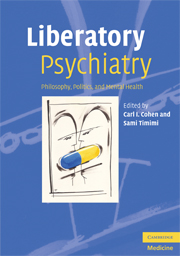Book contents
- Frontmatter
- Contents
- Contributors
- Acknowledgments
- Introduction
- 1 Working towards a liberatory psychiatry? Radicalizing the science of human psychology and behavior
- 2 Power, freedom, and mental health: a postpsychiatry perspective
- 3 Challenging risk: a critique of defensive practice
- 4 Democracy in psychiatry: or why psychiatry needs a new constitution
- 5 German critical psychology as emancipatory psychology
- 6 Psychopolitical validity in the helping professions: applications to research, interventions, case conceptualization, and therapy
- 7 Class exploitation and psychiatric disorders: from status syndrome to capitalist syndrome
- 8 Ecological, individual, ecological? Moving public health psychiatry into a new era
- 9 Children's mental health and the global market: an ecological analysis
- 10 Postcolonial psychiatry: the Empire strikes back? Or, the untapped promise of multiculturalism
- 11 A new psychiatry for a new world: postcolonialism, postmodernism, and the integration of premodern thought into psychiatry
- 12 Neoliberalism and biopsychiatry: a marriage of convenience
- 13 Psychoanalysis and social change: the Latin American experience
- 14 A new psychiatry?
- Index
- References
6 - Psychopolitical validity in the helping professions: applications to research, interventions, case conceptualization, and therapy
Published online by Cambridge University Press: 25 August 2009
- Frontmatter
- Contents
- Contributors
- Acknowledgments
- Introduction
- 1 Working towards a liberatory psychiatry? Radicalizing the science of human psychology and behavior
- 2 Power, freedom, and mental health: a postpsychiatry perspective
- 3 Challenging risk: a critique of defensive practice
- 4 Democracy in psychiatry: or why psychiatry needs a new constitution
- 5 German critical psychology as emancipatory psychology
- 6 Psychopolitical validity in the helping professions: applications to research, interventions, case conceptualization, and therapy
- 7 Class exploitation and psychiatric disorders: from status syndrome to capitalist syndrome
- 8 Ecological, individual, ecological? Moving public health psychiatry into a new era
- 9 Children's mental health and the global market: an ecological analysis
- 10 Postcolonial psychiatry: the Empire strikes back? Or, the untapped promise of multiculturalism
- 11 A new psychiatry for a new world: postcolonialism, postmodernism, and the integration of premodern thought into psychiatry
- 12 Neoliberalism and biopsychiatry: a marriage of convenience
- 13 Psychoanalysis and social change: the Latin American experience
- 14 A new psychiatry?
- Index
- References
Summary
Introduction
What is preventing the advancement of liberation psychiatry? Why is it that after so many volumes of critique, the helping professions are still firmly grounded in traditional medical models (Prilleltensky, 1994; Teo, 2005)? How can we challenge the regnant deficit, reactive, disempowering, and individualistic oriented approaches in psychology, psychiatry, social work, counseling, and allied professions? This chapter is a modest attempt to translate the abundant theoretical critique of the helping professions into practical guidelines for action. In our view, there is a wide gap between the cogent reservations about dominant paradigms and actionable formulations. Unless we manage to convert critique into construction, and deliberation into delivery of new practices, the gap between discourse and action will continue to grow, leaving behind a trail of doubly disaffected practitioners; disaffected with the medical model, and disaffected with critical approaches that fail to suggest convincing alternatives for practice.
We build our case for action around the concept of psychopolitical validity. Following an introduction of the construct and its rationale, we articulate its implications for research, interventions, case conceptualization and therapy. The first two areas of interest apply to all the helping professions, whereas the last two pertain more directly to therapeutic interventions.
What is psychopolitical validity?
Psychopolitical validity is a criterion for the evaluation of understanding and action in professions dealing with oppression, liberation, and well-being. The criterion consists of the level of attention given to the role of power in explaining psychological and political phenomena affecting suffering and well-being.
- Type
- Chapter
- Information
- Liberatory PsychiatryPhilosophy, Politics and Mental Health, pp. 105 - 130Publisher: Cambridge University PressPrint publication year: 2008
References
- 1
- Cited by



